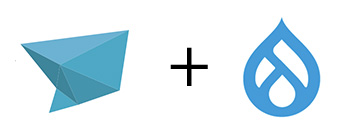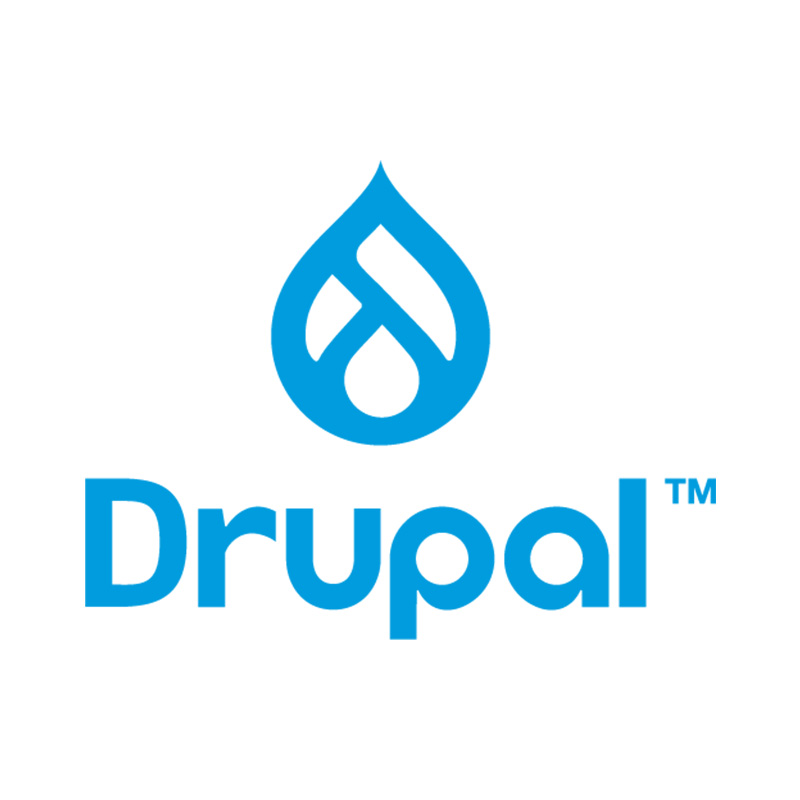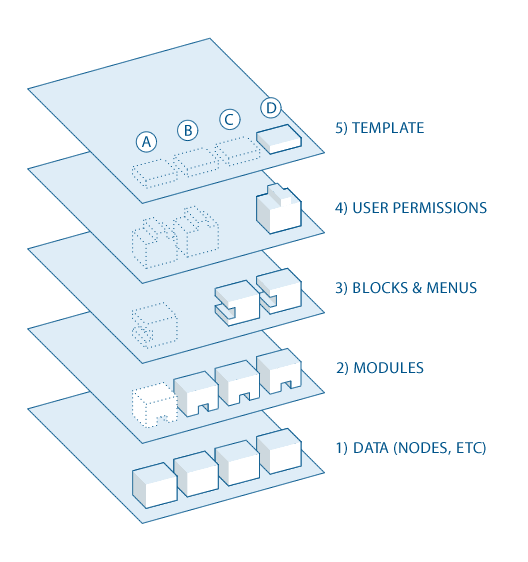Tuesday : a team of drupal cms experts
Tuesday and Drupal, expertise and love story♥
The Tuesday agency has been developing sites with the Drupal CMS since... 2007, that is, since the Drupal 5 version. A Drupal expertise is built over time. And as it seems that after 15 years of marriage, it is the crystal wedding: well 🍾 !

In 15 years, we do a lot of things. Among them, of course, many children (see our references).
At the beginning, it's crazy love, nothing is impossible, no project is unattainable. Then, as time goes by, you become more reasonable; you appreciate all the qualities of the other person and you have integrated their rare little flaws 😇
Today, at Tuesday, we know that Drupal is a demanding "partner", whose power makes sense on complex digital projects and should be reserved for them: interconnected websites, often multisite and multilingual, highly solicited, both by the level of traffic and by the volume of the database. This has become our real expertise: designing and producing high quality, high performance Drupal websites that meet the requirements and challenges of the companies we work for.
A project at stake that you would like to discuss,
a complex need that you would like us to think about ?
Drupal, let's make the presentations !
Drupal is a technological solution that allows you to create all kinds of web applications: "showcase" websites, intranet-extranet systems, content portals, e-commerce sites. And much more!
If we had to summarize its main qualities, we would say: modularity, power, versatility, and the dynamism of its truly open-source ecosystem.
Drupal was born in 2001 in Anvers, from a young father Dries Buytaert who will be very quickly surrounded by a large community of followers. Originally conceived as a "quick website assembler" according to its own creator, it has continued to grow and improve with each new version - thanks in particular to its highly organized, very involved and hyper-dynamic community of developers and contributors.
While each new version of Drupal has contributed to the overall improvement of the solution, versions 7 and 8 marked quite major changes.
Launched in 2010, version 7 positions Drupal as one of the most powerful CMS solutions on the market: from then on, more and more major players adopt it (in France, for example, the government.fr website or that of the Bank of France runs on Drupal) which of course reassures companies and accelerates its deployment at the international level.
A few years later, in 2015, the 8th edition is released and it is a real big-bang: Drupal is now based on the Symfony 2 framework (a French technology, cocorico). It is a complete overhaul of its operation. As a result, all Drupal experts (including the Tuesday team...) have to assimilate a new development logic. At the time, it was complicated for the whole community. The demand for technical expertise increases, some get discouraged and throw in the towel. However, once the transition is properly integrated, Drupal becomes an even more powerful and reliable solution in the long term!
We are now at Drupal 9. The technological foundation is solid, it will be able to support all future evolutions - which is obviously a crucial reassurance for companies that are considering adopting it as well as for those that have done so.


Drupal, halfway between expert CMS and framework
The term CMS literally means Content Management System: a set of tools integrated with each other that allows the development and dynamic updating of websites. In other words, a CMS is an application that creates and manages digital content. The most widely installed CMS in the world is WordPress.
A framework is a professional software that allows computer developers to build an application, using ready-made bricks, which can be modified with specific additional "code". From a framework, in theory, nothing is impossible ;)
The versatility and the great adaptability of Drupal make that there is a debate (a little academic, admittedly) on what Drupal is. Like any classic CMS, Drupal brings a real ease of use - once you get past the somewhat demanding learning curve. Moreover, in the eyes of professional developers, Drupal can be used as a framework and allows any ad hoc development - very often required when connecting to the heart of an IS: import/export via Web Services, external authentication, connection to an LDAP directory, data synchronization with a third-party system, etc.
Since Drupal 8 and its integration of Symphony 2 technology, Drupal is often renamed CMF - Content Management Framework - which implies a notion of extensibility and functional modularity. This is not just a question of terminology. The technological concepts on which Drupal is natively based allow development teams to respond to very ambitious projects, such as the implementation of a multi-connected Product Information Management (PIM) platform, an international Digital Assets Management solution, or a site factory.
CMS, framework, CMF: Drupal is cut out for the most ambitious projects.
What is a Drupal CMS expert ?
A Drupal expert or experts? Several Drupal experts, of course!
As you have understood, the Drupal CMS is a tool that is both powerful and demanding. To get the most out of it, you need to build a multidisciplinary team, with specialists in each field.
Each member of the Tuesday team has a cross-functional view of the Drupal CMS, understands how it works globally and is an expert in "his or her field". But what's important is that with experience and the number of projects we've worked on together, everyone knows the specific needs of their teammates for their own parts of the project. Coordination becomes natural and deliverables flow smoothly. Rather than a "Drupal CMS expert", look for a team of experts like the one at Tuesday ;)
- Drupal Project Manager: He/she is both in the plane and in the control tower! He/she is primarily responsible for the perfect understanding of the client's needs and their formalization. Experienced in DevOps techniques and tools, he/she ensures that the team flies in tight formation and that the project trajectory is under control.
- UX/UI Designer: talent or skill? Probably a bit of both. In any case, his contribution has a major impact on the visible part of the Drupal iceberg: design originality, navigation fluidity, responsive optimization. And as new needs often arise during the course of the project, he/she brings his/her creativity to find the most astute graphic solutions while remaining within the defined line.
- Site Builder: he/she is the architect of the project on the technical level. His/her knowledge of the Drupal ecosystem is at the center of his/her expertise. He assembles and configures all the modules necessary for the site to function. He/she knows both the potential and the limits of the system. He/she rarely develops code (he/she will rather call upon other team members) but is able to customize the different modules to adapt to the specific constraints of the project.
- Front-end developer: he/she is the one who does the integration in HTML / CSS and also codes in Javascript to customize the interface or refine the user experience. He/she develops the theme of the site technically, based on the work done by the UX/UI Designer. These two are in-di-vi-si-ble :)
- Back-end developer: he/she is responsible for the development of modules in PHP / Symfony. He/she also knows the Drupal ecosystem inside out, so as to avoid reinventing features that already exist in the catalog of modules developed by the community. When the customer's needs are very specific, he will take care of a specific development, in strict compliance with Drupal standards (*). In many projects, Drupal must be connected to one or more elements of the customer's information system.This is why the back-end developer must absolutely master the Drupal API, whose reputation for robustness and power is well deserved!
It is not uncommon for the same person to have several of these skills: this is what we call a fullstack developer. The dev and web professionals who have joined the Drupal galaxy keep an eye on the latest developments, exchange ideas with their colleagues, and constantly train themselves, thus enriching their skills. Having these versatile contributors on a team like Tuesday's is of course a real plus. However, building a Drupal site that performs well on all levels is rarely within the reach of an "isolated" person - or the project will take a very long time... A site that performs well, looks good, is perfectly integrated with other IT assets, and is scalable and fluid is necessarily the result of a collaborative dynamic within a team of experts. If this team is united and experienced, your project is in good hands.
A project at stake that you would like to discuss,
a complex need that you would like us to think about ?
(*) If it can meet the needs of other companies, this "in-house" development could be proposed to the Drupal community and become an official module on drupal.org - we have a few to our credit at Tuesday.